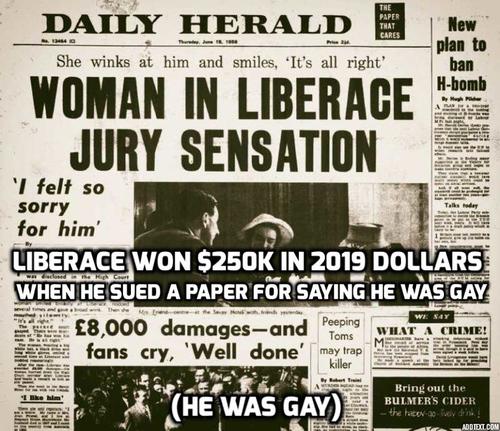
The Downside Of Libel Law: Cases Where People Who Were Sued For Telling The Truth Lost
02/28/2019
The American Supreme Court ruled that L. B. Sullivan couldn’t sue The New York Times because, in effect, he was a BadWhite. The Michigan Supreme court said the same thing, more explicitly, when James Edwards sued the Detroit News. But the Sullivan ruling also protects me.
Below, I referenced Glenn Reynold’s article on libel laws.
Reynolds, AKA Instapundit, writes
Speaking as a blogger, columnist and occasional reporter, I have to say the Sullivan ruling has been very, very good to me. You have to work pretty hard to commit actionable libel under present law, and like everyone else in the business of writing and speaking and so on, I’m pretty happy with that legal regime. But this doesn’t mean Thomas is wrong.
Clarence Thomas is right: Here’s why Supreme Court should revisit libel law overreach
Glenn Harlan Reynolds, USA Today, February 28, 2019
The problem is that bad people who've done bad things can use the law of libel to cover their sins. They don’t have to be rich and powerful, they just have to be willing to lie. This is a continuing problem in Britain and Canada which still have the law of libel.
When Kathy Shaidle was being sued in Canada, I wrote that the United States if very lucky to have its strictly limited law of libel. In New York Times vs. Sullivan the media won the right not to be sued for libel, in effect, even if they lie.

This is bad if you're a victim of libel, (like Steven Hatfill) but great if you're telling uncomfortable truths about someone. You may think that it would be nice to sue people who libel you, but in Commonwealth countries with no First Amendment and a tradition of suing for libel, people frequently sue, and win, against people who are telling the truth.
- Oscar Wilde had the Marquess of Queensberry arrested on a charge of criminal libel for calling him a "posing Somdomite." The spelling error was the Marquess’s, but the legal error was Wilde’s — Wilde was a "posing Somdomite." He lost the case, and went to jail, only because the Marquess had an excellent lawyer.
- In 1959, Liberace sued the London Daily Mirror for calling him effeminate and implying that he was a "posing Somdomite." He won his case, lying under oath to do it, and got eight thousand pounds out of the Daily Mirror, which was a lot of money in 1959.
- Jonathan Aitken (right) sued the Guardian for saying he was receiving gifts from the Saudis. He was, and he tried to get his 17-year old daughter to lie
"perjury and intending to pervert the course of justice," — more less the same crimes Bill Clinton committed in his lawsuit with Paula Jones.
- Jeffrey Archer sued the British Daily Star in 1987 over allegations that he'd had sex with a woman named Monica Coghlan. Though he had in fact had sex with that woman, he won the case and 500,000 pounds. The editor of the Daily Star was fired. Only in 1999 did it transpire that he'd perjured himself, and in 2001 he went to jail for the perjury.
With the last two, the point here is not just that they lied, but that they were Members of Parliament suing the press for printing the truth. Wikipedia says that it’s "now legal" since his conviction for perjury, to call Archer a liar. Americans will wonder at the fact that it was ever illegal.
British Prime Minister David Lloyd George was a special case — I once noted that he has two chapters to himself in the Penguin Book Of Lies, and fraudulent lawsuits were why.
Nobody much doubts that David Lloyd George conducted an affair with (among many other women) the wife of a Montgomeryshire doctor, Mrs Catherine Edwards, but, as Chancellor of the Exchequer in 1909, he sued The People for libel for repeating this. Lloyd George persuaded his wife Margaret, who knew the truth, to perjure herself in court and deny it. Their son Richard reported his father’s conversation beforehand: "You must help me, Maggie. If I get out of this I give my oath you shall never have to suffer this ordeal agaiin." The People lost, and Lloyd George continued his philandering, and became Prime Minister.[Scandals? Well yes, minister, we just can’t say no — Times Online, By Matthew Parris, December 2, 2004]
Remember, in the history of libel and libel chill, these are just the people who got caught. We don’t know how many politicians got away with all kinds of crime because editors were afraid of being sued.
The point here is that libel law is a seriously Bad Thing, and protects the guilty more than the innocent. America is lucky not to have it.
